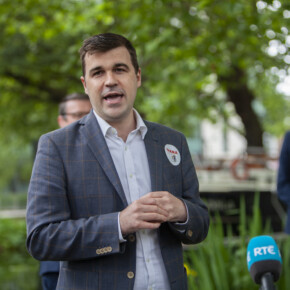Dublin’s special education crisis: The parent’s side
Dublin People 05 Mar 2025
56 kilometres.
That is the distance from Dublin to Navan by car.
That is the distance Jimmy Newman may have to drive if he can’t secure a school place for his daughter, Clodagh.
Clodagh will begin secondary school in September but is non-verbal, autistic and has a moderate learning disability.
Jimmy and his wife Sarah have applied to over a dozen schools in Dublin, both Northside and Southside and have been unsuccessful in each application.
The reason given each time? “Oversubscription.”
Despite a psychological assessment and a diagnosis of her cognitive abilities, a school place cannot be found for Clodagh.
Schools in Inchicore, Tallaght and Santry have been applied to, to no avail.
With the clock ticking, the Newman family have now been forced to apply to schools well outside Dublin; schools in Enfield and Navan in County Meath and Drogheda in County Louth have been contacted with the hope of securing a place.
As Jimmy puts it, it is a case of “one rejection letter after another; it’s incredibly frustrating.”
More often than not, they are told that Clodagh meets the criteria but there is simply no room for her.
With autism, there is a spectrum, ranging from high functioning autism or aspergers where people on the spectrum are able to integrate into traditional educational or work environments, mild learning disabilities in the middle and severe learning disabilities on the other end which requires specialised therapy and in this context, special education provisions
2020 research from the Health Research Board found that of the 5,753 people registered with the National Ability Supports System that year, 75% of people with autism were under the age of 18.
There was a 79% to 21% split of male to female, and the report found that the gender disparity is “more pronounced in younger ages.”
Intellectual disability was the most reported additional disability for those with autism followed by speech and/or language.
In the event that a school place is not secured for Clodagh, her mother Sarah is willing to briefly go on a career break from teaching to provide the education for her daughter which the state is seemingly unwilling to provide.
Speaking to Jimmy reveals frustration in his voice; a sense of tiredness.
A candidness broke through; he stated that the family had a better chance of securing a school place for Clodagh outside of Dublin, saying “that’s just the reality of it.”
Jimmy said that the family were in touch with Sinn Féin TD Pearse Doherty who raised the issue in the Dáil in February.
Doherty said the Newmans’ file is “so thick.”
“They have been applying for the last three years to every single school and have been refused. They have been number one, six or eight on the list.”
“This is not the first time that we have had a debate on this. If you have children with additional needs, this government is not looking after your needs.”
The Newman’s are aware that Clodagh will need to be a part of an ASD unit in a mainstream school; they are at a relative advantage compared to other families in the same situation.
The issues facing the Newmans are endemic to the crisis; securing a diagnosis and getting seen is one thing, but actually securing a place is another.
And even when a child can secure a school place, it is another matter if the teachers have the tool kit to deal with it.
A teacher with over 40 years of experience teaching on the Northside told us that ADHD and dyslexia were known issues when they started out in teaching, but the prevalence and knowledge to deal with students on the autism spectrum has only come out in recent years.
Despite the government trumpeting that they have spent €10 billion on education in last year’s budget, the problems in Ireland’s education system can be traced back to the post-2008 milieu.
As has been proven with the NHS in the United Kingdom, merely spending money doesn’t solve the problem, it requires the staff and the change in governance to back it up.
The malaise in the Irish education system took hold after the 2008 economic crash.
In the Programme For Government agreement for the Fine Gael-Labour coalition which took office in March 2011, it stated “Ireland has experienced a decline in educational outcomes in recent years. We will draw from top-performing education models like Finland to reverse this trend.”
“Even in our country’s crisis, we can make progress in education and protect frontline services,” the document read.
The 2011 Programme For Government specifically mentions “we recognise the critical importance of early diagnosis of autism and early intervention and address current deficits in this area. We will reverse the cut to the number of psychologists in National Educational Psychological Service in Budget 2011.”
Per the government, NEPS is the psychological service of the Department of Education and provides educational psychological support to primary, post-primary and special schools in Ireland.
In 2011, when that Budget was delivered there were 173 psychologists employed by NEPS.
In 2024, 225 psychologists were employed by the state, a mere 29.4% increase.
In the meantime, the number of students sitting state examinations has only doubled.
In 2011, 59,000 students sat the Junior and Leaving Certificate exams in Ireland; in 2024, that same figure had more than doubled to 136,000, a 130.5% increase.
The number of psychologists employed by NEPS has failed to scale up with the demand.
The reasons for this can be attributed to the post-2008 economic crash mentality still existing in the halls of power.
Money may no longer be an issue, but the reluctance of not wanting to hire more bodies persists.
This has manifested itself in the healthcare system and is clear to see in the education system too.
Those lost years in the 2010s when saving costs by any means necessary became the government’s sole ambition may have saved the country money, but it came at a very real human cost.
In the case of child development and developmental disorders, early intervention is critical.
The earlier someone with a learning disability or neurological condition is seen and receives therapy, the better chance they have of integrating into mainstream education and workforce.
Instead, a country has been created where a teacher is on the verge of taking a career break to educate their child with autism.
Help us break this cycle.
If you have a story to share, please feel free to contact us at news@dublinpeople.com or if you would rather call our number is 01862161.











